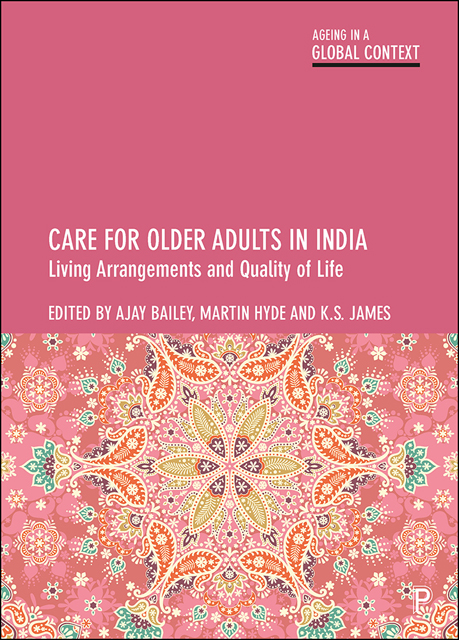Book contents
- Frontmatter
- Contents
- List of figures and tables
- Notes on the editors
- List of contributors
- Acknowledgements
- Series editors’ preface
- Map of India
- 1 Introduction: Living arrangements and care in India
- 2 Theorising care and relationships in the age of migration
- 3 Emerging living arrangements of older adults in India: patterns and welfare implications
- 4 Living arrangement concordance and the well-being of older persons in India
- 5 Family size and living arrangements among older adults in Kerala: panel data analysis, 2004– 19
- 6 Care arrangements for older adults: exploring the intergenerational contract in emigrant households of Goa, India
- 7 All my responsibilities towards my children are over! Linked lives and life course obligations among older adults with migrant children in India
- 8 Interpreting the landscapes of care for older men in Delhi and Kolkata: perspectives from care receivers and caregivers
- 9 The role of cultural meaning system and place attachment in retaining home ownership while residing in retirement homes in Kerala, India
- 10 Decision-making and choice or sine qua non? Care home entry in Tamil Nadu
- 11 Welfare and development programmes for older adults in India
- 12 Lessons and future directions for caregiving research in India
- Index
6 - Care arrangements for older adults: exploring the intergenerational contract in emigrant households of Goa, India
Published online by Cambridge University Press: 13 October 2022
- Frontmatter
- Contents
- List of figures and tables
- Notes on the editors
- List of contributors
- Acknowledgements
- Series editors’ preface
- Map of India
- 1 Introduction: Living arrangements and care in India
- 2 Theorising care and relationships in the age of migration
- 3 Emerging living arrangements of older adults in India: patterns and welfare implications
- 4 Living arrangement concordance and the well-being of older persons in India
- 5 Family size and living arrangements among older adults in Kerala: panel data analysis, 2004– 19
- 6 Care arrangements for older adults: exploring the intergenerational contract in emigrant households of Goa, India
- 7 All my responsibilities towards my children are over! Linked lives and life course obligations among older adults with migrant children in India
- 8 Interpreting the landscapes of care for older men in Delhi and Kolkata: perspectives from care receivers and caregivers
- 9 The role of cultural meaning system and place attachment in retaining home ownership while residing in retirement homes in Kerala, India
- 10 Decision-making and choice or sine qua non? Care home entry in Tamil Nadu
- 11 Welfare and development programmes for older adults in India
- 12 Lessons and future directions for caregiving research in India
- Index
Summary
Introduction
Demographic ageing and the associated changes in population health are necessitating a complex reorientation of health systems, public spending, social security and living arrangements of older adults in developing countries (Bloom et al, 2015; Goodman and Harper, 2013; Lamb, 2013). In countries such as India, the consequences of ageing are far more severe because insufficient social security systems make families the main providers of support to older adults (Bloom et al, 2010). Changing demographic circumstances, such as the increased mobility of adult children, fewer siblings and increased longevity of parents, are influencing care arrangements in Indian households (Croll, 2006; Dhillon et al, 2016). The BKPAI (2011) study on the elderly in India reports that 6.2 per cent of older adults live alone, 14.9 per cent live exclusively with their spouse and 78.9 per cent of them live with children and other family members respectively, and importantly, the proportion of older adult women who live alone is nearly four times in comparison to older adult men (Ugargol et al, 2016). The traditional Indian family is in transition and the modified extended family where parents, children and other relatives do not necessarily live under one roof or share a hearth is now becoming common (Rajan and Kumar, 2003; Medora, 2007). Simultaneously, a cultural norm exists in India that older adults will continue to live with and receive their care from family members (Bongaarts and Zimmer, 2002; Ruggles and Heggeness, 2008 ) and living alone or in old age homes is interpreted as a sign of breakdown of traditional Indian values in public discourses (Medora, 2007; Lamb, 2013).
Though migration of adult children is considered one of the most effective poverty reduction strategies for families in the developing world (Stark and Lucas, 1988; Clemens, 2011) and increased incomes from migration can provide support for parents left behind, often the physical presence of a caregiver is the most desired but missing element (Bohme et al, 2015; Dobrina et al, 2015). Miltiades (2002) found from her study of left-behind Indian older parents that migration of adult children changes household dynamics and leaves families, mainly older adults, in disarray.
- Type
- Chapter
- Information
- Care for Older Adults in IndiaLiving Arrangements and Quality of Life, pp. 86 - 117Publisher: Bristol University PressPrint publication year: 2022
- 1
- Cited by



